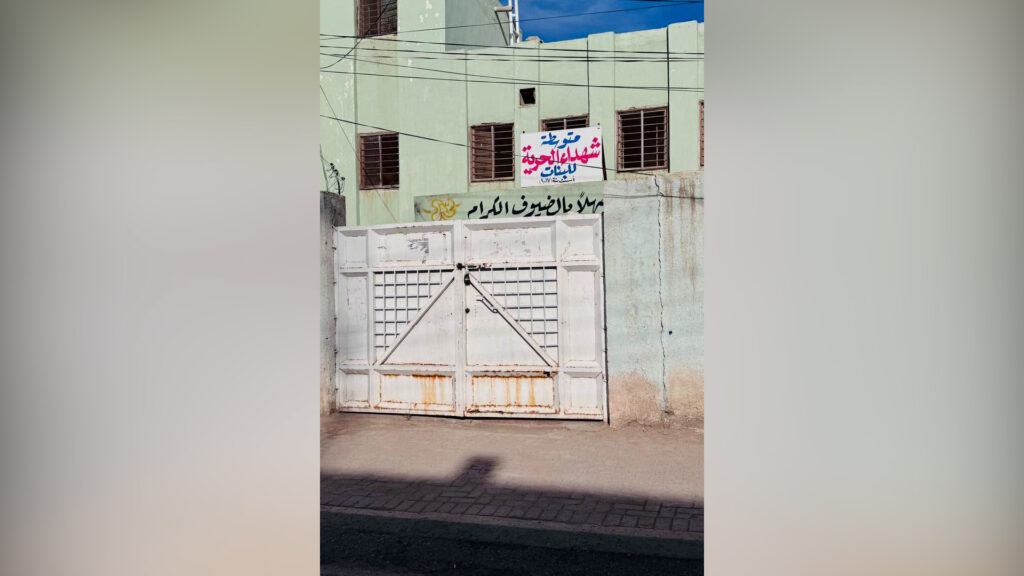
Teachers gather outside a school in Baghdad on Sunday during the first day of a nationwide strike demanding better pay, legal protections, and improved living conditions.
'Our demands are legitimate'
Many Iraqi schools closed as teachers launch nationwide strike over pay and benefits
BAGHDAD — Thousands of teachers across Iraq launched a nationwide strike Sunday, refusing to return to classrooms after the Eid Al-Fitr holiday and protesting outside education directorates in Baghdad, Wasit, Basra, Karbala, Diwaniyah, Kirkuk, and Najaf.
The educators are demanding comprehensive pay reforms, including salary increases, better benefits, housing allocations, and approval of the long-stalled Teacher Protection Law.
“We are demanding fair treatment under the law and a better standard of living,” protesters in Baghdad’s Bismayah district said, citing disparities between schoolteachers and university faculty.
Among their demands are a monthly cost-of-living allowance of 100,000 Iraqi dinars ($67.60), an increase in professional bonuses to 150,000 dinars ($101.40), and higher allowances for transportation, spouses, and children.
In Basra, about 100 schools closed Sunday as teachers joined the strike. “We closed our school today and sent our students home in solidarity with all the educators of Iraq,” said Atheer Al-Jaberi, a representative of Basra’s teaching staff. “The government is reluctant to raise our salary scale, grant us land plots, or pass the law that’s been stuck in parliament for eight years. A country that does not respect its teachers is a country that does not deserve respect.”
Hussein Zal’an, principal of Al-Mutawwara Secondary School in Basra, said, “Improving a teacher’s livelihood is the same as preserving their dignity. I have teachers with 10 years of service who earn 700,000 dinars a month (about $473), of which 300,000 dinars ($203) goes to rent. That’s not enough to support a family.”
Basra Teachers’ Syndicate leader Safaa Al-Samer urged immediate government action, warning that continued neglect could lead to the education system’s collapse.
In Wasit governorate, hundreds of teachers gathered to demand a doubling of professional allowances to match university faculty, land allocations, and permanent hiring for contract staff.
“Our demands are legitimate,” said Ibtisam Hadi, a veteran teacher. “I’ve served 30 years with no benefits, teaching in crumbling schools while curricula grow harder each year.”
Ahmad Al-Mousawi, a teacher from Numaniyah, added, “I’ve paid over 40 million dinars (about $27,000) in rent. I’ve never received land or a housing loan. This strike will continue until our basic rights are met.”
In Kirkuk, teachers joined the walkout in solidarity. “We’ve been excluded from financial upgrades granted to other ministries,” teacher Idris Abdul-Jabbar said. “We want our voices heard.”
Maali Muzaffar, another Kirkuk teacher, added, “We are demanding our rights, but some teacher representatives in other cities have been detained. They must be released—this is a peaceful and lawful movement.”
On Saturday, the Karbala Teachers’ Representation Committee declared a full strike, citing a lack of support from the Teachers’ Syndicate and government inaction. The committee urged full participation, emphasizing that instruction was paused but students were not the target.
The Coordinating Committee for the Teachers’ and Instructors’ Strike had confirmed Thursday that the stoppage would begin Sunday unless demands were immediately met.
“This is a final decision unless there is an immediate and official response to our demands,” the committee said in a statement. “Our movement is lawful and constitutional, aimed at preserving the dignity of teachers and ensuring a decent quality of life.”
The strike currently has no end date, highlighting teachers’ growing frustration over stalled reforms.





